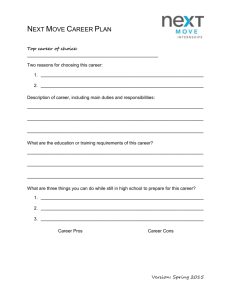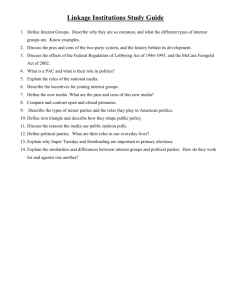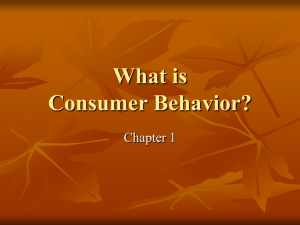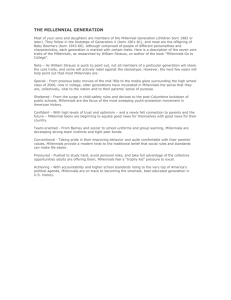here - Squarespace
advertisement
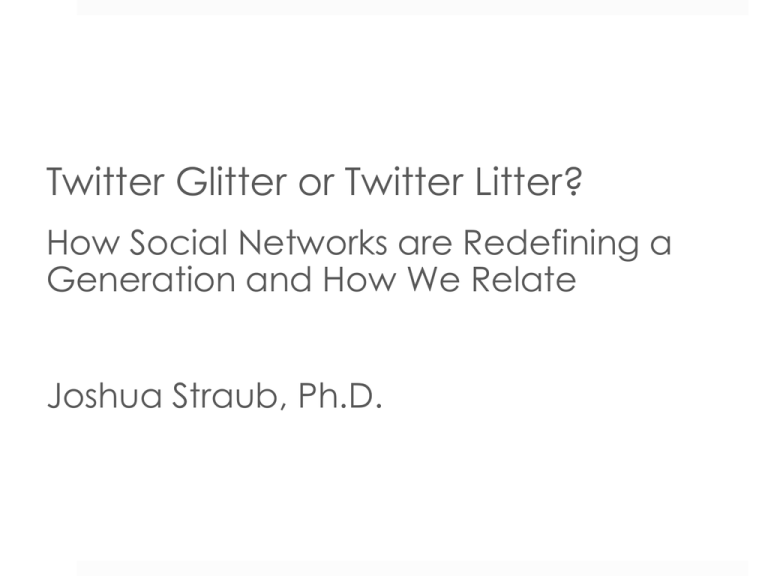
Twitter Glitter or Twitter Litter? How Social Networks are Redefining a Generation and How We Relate Joshua Straub, Ph.D. Dr. Joshua Straub Objectives Participants will: Identify and describe the pros and cons of today's changing social networks List seven new, surprising findings about the Millennial Generation and their relationships Explore strategies for using these findings to help the Millennial Generation grow relationally and get them engaged in the Church Who are Millennials? Optimistic Tech-Savvy Volunteer Pampered/ Trophies Poor work ethic? Helicopter parents Entitled Caring Flip-flops Who are Millennials? Ask Why Desire Authenticity Homosexuality & Abortion Grew up in 9/11 and Iraq War Horizontal/ Teamwork, not up-down leadership More concerned with passion/ lifestyle than money Poor work ethic? Diverse Millennials Connected 92% are part of a social networking site 94% of Millennials have a cell phone 31 % of 8-10 year olds 8-18 year olds consume 7 hours 38 min of media/ day Millennials spend nearly 2 hours a day texting (avg teen over 3000 texts/ month) 83% of Millennials sleep with their phones right next to them and turned on Millennials Connected Cyberbullying 88% have witnessed a friend being cruel online 80% have tried to stop it 21% have joined in Millennials Connected Online Dating 40 million in U.S. have tried online dating 18.5 months: Avg length of courtship for marriage that met online 42 months: Avg length of courtship for marriage that met offline 17% of marriages last year met online 20% of current committed relationships 33% of women have sex on first in-person online dating encounter Online Relationships Pros and Cons Access to a wealth of information Pro: More information, and up to the minute Con: Information overload “We’ve always had external sources of information that supplemented our memory, but it seems to me that the danger here is that if we, in effect, train our brains to forget rather than to remember you may still be able to find the individual bits of information when you need them, but what you lose is the personal associations that happen when you actually go through the process of remembering something.” Dr. Nicholas Carr, Pulitzer Prize finalist; Dr. Gary Small, UCLA says parts of our brain really can stop functioning. Online Relationships Pros and Cons Con: Information overload Reasoned learning decreases Shallow thinking…leads to shallow living Dr. Nicholas Carr Online Relationships Pros and Cons New Trend: Attention spans and recent shifts “We appreciate your concern for your child's use of our application, but unfortunately we cannot give you access to the account or take any action on the account at your request. We are generally forbidden by privacy laws against giving unauthorized access to someone who is not an account holder.” New Trend: Waldorf Schooling Online Relationships Pros and Cons “Skimmers” Multitasking- “dumbing down” effect Online Relationships Pros and Cons Allows you to connect with more people Pro: More people build social capital Con: Less quality of relationships; more social isolation; increase in loneliness Overestimate Levels of Intimacy--digital vs. true Pro: Maintain relationships from afar / old friends Con: Expecting more from online relationships than they can give; can’t substitute electronic for physical Online Relationships Pros and Cons What is intimacy? LOL vs. hearing people laugh (mirror neurons) Physiological benefits of laughing ___________ builds intimacy. Confrontation online or text Blocks negative emotional responses which creates illusion we’re doing no harm. Decrease in empathy Online Relationships Pros and Cons Social Media Contagion Effect (John Cacippo, U of Chicago) Con: loneliness transmitted via social networks (offline relationships if a direct connection of yours is lonely, you’re 52% more likely to be lonely; If it’s a friend of a friend, 25% more; 3 degrees out, 15 % more) Taken to online world, common courtesy and politeness is often missing; increase in social isolation Pro: As we become increasingly networked, it becomes more vital we monitor how we behave Millennials Connected 50% of 18-29 y.o. first thing they do as soon as they wake is check Facebook Comparing with Others Narcissism Voyeurism > Self-Pity Gaming “the strength of the evidence linking media violence to youth aggression is stonger than the evidence linking lead poisoning with mental retardation and more definitive than the case linking secondhand smoke with cancer.” –Hunter & Blair (2013) “Research has associated exposure to media violence with a variety of physical and mental health problems for children and adolescents, including aggressive and violent behavior, bullying, desensitization to violence, fear, depression, nightmares and sleep disturbances.” -The American Academy of Pediatrics (Taming) (Wandering) (Numbing) Technology Gaming Social Media Multitasking 7 Interesting Facts 1. They use technology to create a stronger sense of self. 2. They have more pride and loyalty than we may think. 3. They don't believe job security exists. 4. They are all about the community. 5. They are family-oriented. 6. They care more about causes than organizations. 7. They are leaving the church more rapidly than ever. R.E.L.A.T.E. Respect Emotional Control Limits Assertiveness Train (the brain…and our kids) Empathy Respect How is technology taking over your life? “Anything you cannot fast from owns you.” Know your cell phone and what it can do (GPS locaters) Become digitally savvy and know what Millennials are doing online Keep abreast to new technologies (Verizon “family locater” builds a geo-fence) Relationally…don’t judge your teen or Millennials…respect means you seek the underlying motivation behind their behavior. Understanding is extremely important here. Golden Rule… Emotional Control Model. Model. Model. Don't say anything on email you'd feel uncomfortable saying to someone in person Don’t delay responses to messages you want to avoid Be careful what you say (non-verbal communication is 93% / actual words 7%) Be mindful of emotions and reactions Do not compare to others Limits Model. Model. Model. Set texting hours on Millennial cellphone Put computer in family room Set boundaries on time spent on social networks and in front of screens No phones or screens after 8pm Sunday fast day No phones at meals or when with others No phone until after morning devotions Only check at certain times and for certain periods throughout day Assertiveness Based on Respect…speak your feelings without judging another. Teach them the consequences of their actions (legally, occupationally, etc.) Teach parents to set be assertive in their homes. As long as teens live under their roof they play by their rules. Assert yourself as a mentor and advocate! Train (the brain & our kids) Play board games, motor-skill mentoring, teach them hands-on, fishing, hunting, hiking, outdoor leadership Exercise together Read books together (not e-books) Pray and meditate Relaxation techniques Sequential tasking Empathy Be safe Doing empathy; more than having it Maintain healthy balance of online and offline relationships Build real life network of contacts Balance time with family and on internet and keep them separate References Hart, A. & Frejd Hart, S. (2013). The digital invasion: How technology is shaping you and your relationships. Grand Rapids, MI: Baker Books. Hunter, B. & Blair, K. (2013). From santa to sexting: Helping your child safely navigate middle school and shape the choices that last a lifetime. Abilene, TX: Leafwood Publishers.



